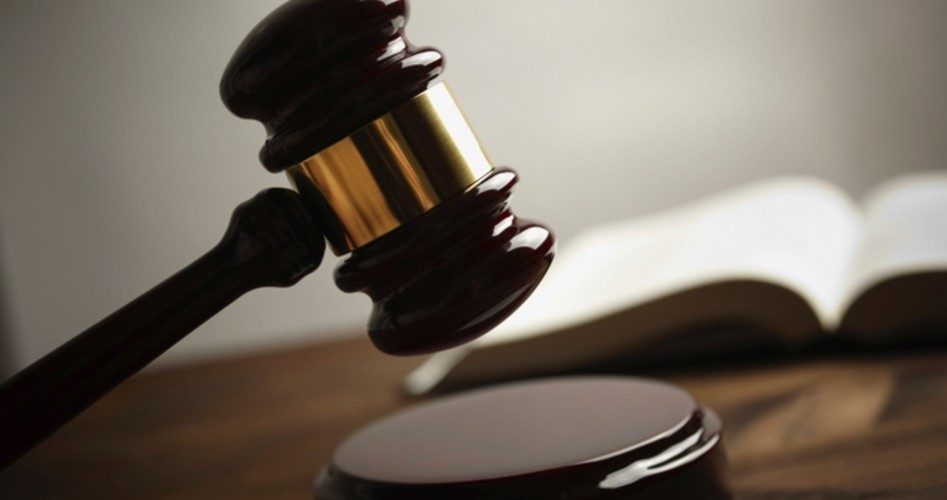
During his press briefing on May 8, White House Press Secretary Sean Spicer announced that shortly after the briefing, the administration would release a list of President Trump’s third wave of federal court nominees. Spicer said, “These 10 individuals that the President has chosen were chosen for their deep knowledge of the law and their commitment to upholding constitutional principles.”
Spicer explained that two of the nominees came from the list of potential Supreme Court nominees that Trump released during the presidential campaign. He named Justice Joan Larsen, who, if confirmed, will be a circuit court judge on the U.S. Court of Appeals for the Sixth Circuit. Larsen is currently serving on the Michigan Supreme Court. The AP reported that Larsen, a former professor at the University of Michigan law school, has written majority opinions for the state supreme court in five cases.
Spicer also named Justice David Stras, who will be nominated as a circuit court judge on the U.S. Court of Appeals for the Eighth Circuit. Stras currently serves as a justice of the Minnesota Supreme Court and previously worked for Justice Clarence Thomas.
The press secretary noted that Trump’s campaign list of proposed judges was put together using resources from the Heritage Foundation, as well as the Federalist Society. The Heritage Foundation is a Washington-based conservative think tank founded in 1973 by Paul Weyrich, Edwin Feulner, and Joseph Coors. The Federalist Society, also based in Washington, was started at Yale Law School, Harvard Law School, and the University of Chicago Law School in 1982 as a student organization to challenge the liberal ideology that prevailed in most American law schools. Its founding members included former Attorney General Edwin Meese and Solicitor General and Reagan Supreme Court nominee Robert Bork. Its membership has since included several Supreme Court justices: the late Antonin Scalia, John G. Roberts, Clarence Thomas, Samuel Alito, and Neil Gorsuch.
Spicer was asked if, aside from the nomination of the 10 judges to fill federal vacancies, the president has any plans to increase the pace of political appointments. Spicer answered:
Part of the review of government is to make sure that we’re looking at these positions and figuring out whether or not the taxpayer is getting the best bang for their buck both in terms of productivity and cost. And so we’re looking through the entire government … to figure out whether or not we can do a better job of filling positions, of staffing the government. But we’re going to continue to have announcements on key positions as this week goes by…. I think that you’re going to continue to see, whether it’s judicial nominations, ambassadors, other key positions — I think we have a very healthy clip of announcements that continue to go out.
After the briefing, the White House made the list of judicial nominations public. In addition to Larsen and Stras, Trump will nominate Louisville, Kentucky, lawyer John Bush, who heads the local chapter of the Federalist Society, for the bench of the Sixth Circuit Court of Appeals.
Professor Amy Coney Barrett of Notre Dame Law School in Indiana will be nominated to serve on the Seventh Circuit. Kevin Newsom, a Birmingham lawyer who served as Alabama’s solicitor general and as a law clerk to Supreme Court Justice David Souter, will be nominated to the Eleventh Circuit in Atlanta.
Judge David Nye of the Idaho Sixth District Court will be nominated to fill Idaho’s long-vacant second U.S. district judge position. Scott Lawrence Palk, an assistant dean at the University of Oklahoma College of Law, will be a nominee to be a U.S. district judge of the U.S. District Court for the Western District of Oklahoma. Damien Schiff, a senior attorney at the Pacific Legal Foundation, will be nominated to serve as a judge on the U.S. Court of Federal Claims.
The president will also nominate Dabney Friedrich of Washington, D.C., previously an assistant U.S. attorney in the Southern District of California, to serve as a district judge on the U.S. District Court for the District of Columbia. Terry Moorer, a magistrate judge on the U.S. District Court for the Middle District of Alabama, if confirmed, will serve as a district judge on the U.S. District Court for the Middle District of Alabama.
Senator Chuck Schumer (D-N.Y.) was quick to criticize Trump’s court nominees. “With this first slate of lower court nominees, it seems that the President is intent on continuing to outsource the judicial selection process to hard right, special interest groups rather than consulting with Senators on a bipartisan basis,” said Schumer. “The President should work with members of both parties to pick judges from within the judicial mainstream, who will interpret the law rather than make it.”
Without realizing it, Schumer’s prerequisite for an acceptable federal judge is the prefect definition of a strict constructionist or constitutionalist — someone who interprets the Constitution as it was written.
Both the Heritage Foundation and the Federalist Society, which provided input to Trump in selecting his nominees, have long advocated for just that sort of judiciary: constitutionalist, rather than activist.
Related article:



